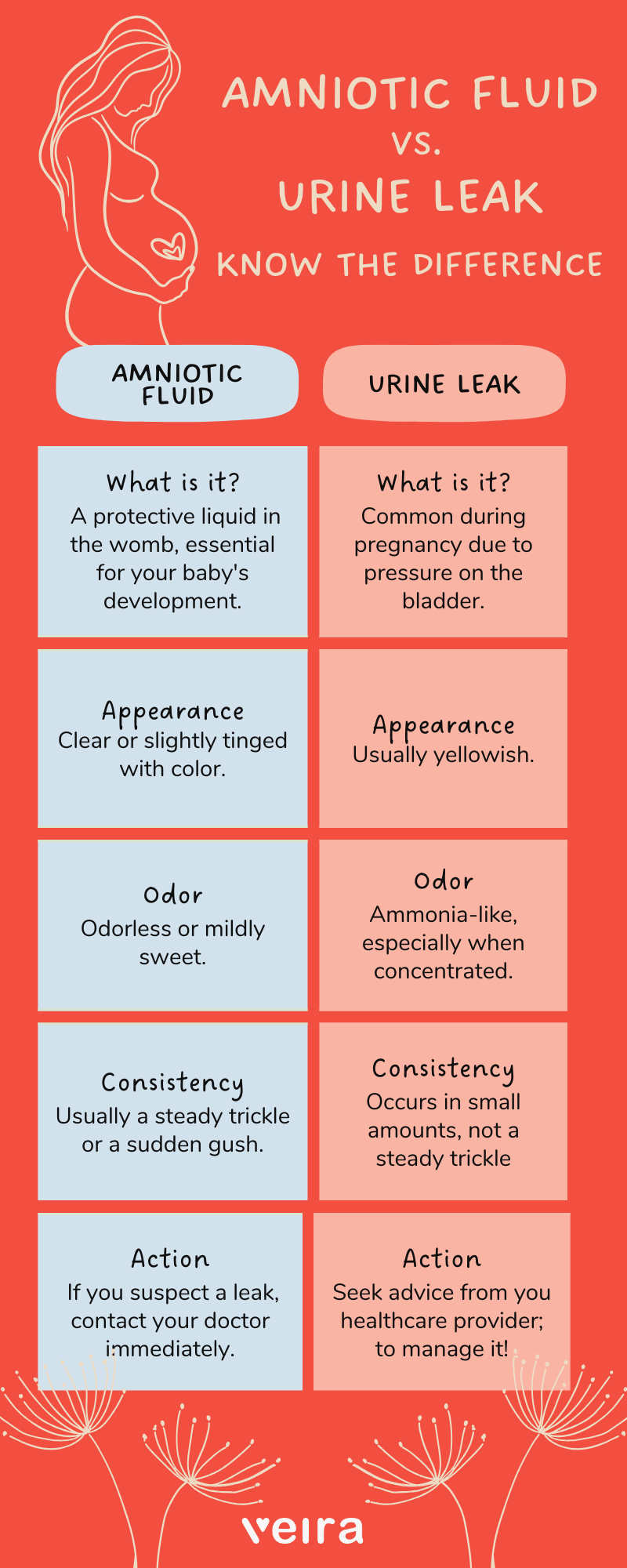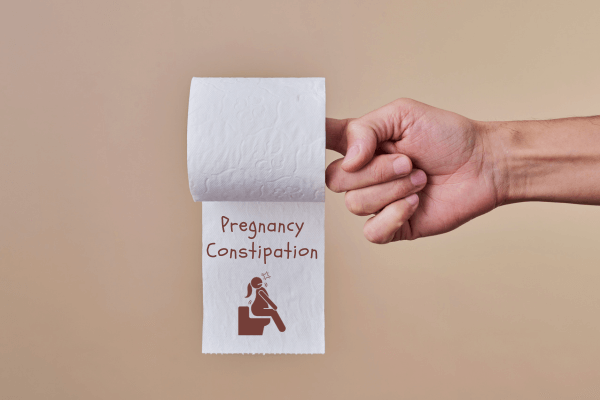Key Points
- Amniotic Fluid's Vital Role: Amniotic fluid is crucial for a healthy pregnancy, providing protection, nourishment, and aiding in your baby's development.
- Amniotic Fluid Leakage: Amniotic fluid leaks signal labor, commonly termed "water breaking." Preterm Premature Rupture of Amniotic Membrane (PPROM) may lead to preterm birth. And in rare cases, continuous amniotic fluid leakage causes low fluid, impacting fetal growth and causing labor com[plications.
- Causes and Risk Factors: Amniotic fluid levels can naturally rise near your due date, causing minor leakage. Other common causes include ruptured membranes during labor, infections, abdominal trauma, and weakened membrane due to multiple pregnancies. Amniocentesis, genetic testing, also carries a small risk of leakage.
- What to Do If You Suspect Leakage: Contact your healthcare provider promptly. Follow guidance, and be ready for a medical examination or tests.
- Early Detection is Key: Early detection and prompt medical guidance are crucial for a safe resolution of the situation. Trust your instincts and seek professional help when needed.
Leaking amniotic fluid can lead to complications if it is not signaling the normal onset of labour. Any untimely leakage of amniotic fluid can be a cause for concern and it’s important to know how to recognise its occurrence. What is amniotic fluid leakage? How do you know if it’s happening? What should you do? In this article, we’ll break it down in simple terms to help expecting parents understand what leaking amniotic fluid is, how to recognise the signs and symptoms of it and what to do if it happens.
What is Amniotic Fluid?
Amniotic fluid is a crucial element of pregnancy, serving as a protective cushion and nourishing medium for your developing baby in the womb. It offers essential nutrients, maintains a stable temperature, and aids lung development through fetal breathing practice. This fluid enables free movement, promoting muscle and bone growth, while also removing waste products and providing some defense against infections. In summary, amniotic fluid plays a pivotal role in ensuring your baby’s well-being and growth during pregnancy, making it an essential part of the prenatal journey. Understanding its importance is key to addressing any related concerns for a healthy pregnancy.
Also Read- Pregnancy Trimesters: How many weeks, months in each?
Leakage of Amniotic Fluid
Amniotic fluid leaks result from a hole or tear in the membrane of the amniotic sac, often signaling the onset of labor, commonly known as your water “breaking.” Preterm Premature Rupture of Membrane (PPROM); i.e. before 37 weeks, can potentially lead to preterm labor and birth. In 2-4% of pregnancies, women experience amniotic fluid leakage throughout the last few weeks, resulting in low amniotic fluid (oligohydramnios), which can lead to poor fetal growth as well as fetal and labor complications.
While not all cases of amniotic leakage are concerning, immediate consultation with your healthcare provider is crucial if you suspect leakage for the health and safety of your pregnancy.
Also Read- Your Pregnancy Week-by-Week Guide
Causes and Risk Factors
- Normal Progression: Amniotic fluid levels can naturally increase as your due date approaches, leading to minor leakage, usually not a cause for alarm.
- Ruptured Membranes: The most common cause is the rupture of the amniotic sac, often associated with the onset of labor.
- Infections: Infections in the amniotic sac or reproductive tract can weaken membranes, increasing the risk of leakage.
- Injuries or Trauma: Physical injuries to the abdomen can lead to amniotic sac rupture, causing leakage.
- Multiple Pregnancies: Carrying twins or more may increase pressure on the amniotic sac, potentially causing leakage.
- Amniocentesis: Amniocentesis is a medical procedure that involves extracting a small amount of amniotic fluid from the amniotic sac surrounding the fetus.
- It is performed to gather information about the development of the fetus especially when this is an increased risk of genetic or chromosomal abnormalities.
- The procedure has a small and rare risk of amniotic fluid leakage. Not all procedures result in this. Skilled professionals perform it under ultrasound guidance to minimize risks.
If you suspect leakage, it’s crucial that you consult a healthcare provider for a timely evaluation to ensure a healthy pregnancy.
Also Read- Pregnancy Support You Need
Signs and Symptoms
One of the common worries among expectant parents is whether the leakage they’re experiencing is “Amniotic Fluid” or just urine. So how can one tell if what they are experiencing is “Amniotic Fluid” leakage? Let’s address this concern.
Amniotic Fluid or Urine?
It’s not uncommon for pregnant individuals to wonder if what they’re feeling is “Amniotic Fluid” or simply urine. Here’s a quick guide to help you differentiate between the two:
Amniotic Fluid:
- It is typically clear and odorless.
- It might be a constant trickle or a slow leak.
- You may notice a feeling of wetness that doesn’t stop.
Urine:
- Urine is usually yellowish and has a distinct smell.
- It tends to come out in larger amounts, especially when you cough, sneeze, or laugh (due to pressure on the bladder).
- Urinary leakage is often intermittent.
If you suspect you might be leaking “Amniotic Fluid” rather than urine, it’s crucial to reach out to your healthcare provider for confirmation and guidance.
Remember: It’s completely normal to have these concerns, and your healthcare provider is there to help you figure out what’s happening.
Sometimes it can be tough to tell if the fluid you are leaking is amniotic fluid or urine leak? Know the difference below –

What to Do If You Suspect Leakage
- Contact Your Healthcare Provider: If you suspect amniotic fluid leakage, the first step is to get in touch with your healthcare provider or midwife promptly.
- Note the signs and symptoms: As described in the section above, keep note of whether the fluid is clear, odorless and continuous. Also note whether you are experiencing any cramps or contraction like pain. Be prepared to describe these symptoms to your healthcare provider
- Follow The Guidance: Your healthcare provider will likely ask you questions about your symptoms and medical history. They may recommend coming in for an examination or monitoring.
- Diagnostic Tests: In some cases, they might perform tests to confirm whether it’s indeed amniotic fluid leakage. This can include a physical examination, ultrasound, or amniotic fluid test.
- Follow Recommendations: Based on their evaluation, your healthcare provider will provide recommendations and options on how to proceed. This may involve bed rest, hospitalization, or other treatments, depending on your specific situation.
Remember, the key is not to panic but to reach out to a healthcare professional promptly for proper assessment and guidance if you suspect amniotic fluid leakage. Early detection and management are essential for a safe resolution.
Medical Diagnosis, Treatment, Self-Care, and Prevention
Once you’ve reached out to a healthcare provider, they will guide you through the necessary steps, which may include a straightforward amniotic fluid test for confirmation. If amniotic fluid leakage is confirmed, the treatment plan will be tailored to your specific situation and your stage of pregnancy.
Alongside medical care, there are proactive steps you can take to support a healthy pregnancy. Staying well-hydrated, maintaining good hygiene to prevent infections, and attending regular prenatal check-ups are essential practices that can help minimize risks and promote the well-being of both you and your baby.
Conclusion
Understanding potential challenges and knowing how to handle it with confidence can make a big difference to the overall pregnancy experience. If you ever suspect leakage, remember: early detection and medical advice are your best allies. Trust your instincts, reach out to your healthcare provider, and follow their recommendation. Your baby’s safety is what matters most, and you’ve got a team of experts ready to support you every step of the way.
Join Veira Life: Your Trusted Partner for a Healthy Pregnancy Journey
Pregnancy can be a time of joy, magic and wonderment; a time of excitement and anticipation of the future. Your journey through pregnancy is a remarkable and transformative time. For reliable information, expert guidance, and a supportive community, look no further than Veira Life. We’re here to help you navigate every aspect of your pregnancy with confidence. Join our community of expectant parents today to access valuable resources, personalized support, and the assurance you need for a healthy pregnancy. Your journey is unique, and Veira Life is here to walk by your side and guide you every step of the way.
References
FAQs
To confirm amniotic fluid leakage, consult a doctor for a proper assessment and guidance. Signs of amniotic fluid leakage include clear, odorless fluid; cloudy, green, or foul-smelling may signal infection. Watch for a continuous trickle or sudden gush, and note warmth. Sometimes contractions can accompany fluid leakage. Seek medical attention promptly.
Staying pregnant after leakage varies. If you suspect water leakage, contact your doctor promptly for personalized guidance. If the amniotic sac ruptures, the duration of pregnancy depends on factors like fetal age, infection risk, and individual health. Labor often starts within 24-48 hours and if not, your doctor may induce labor to avoid complications.
Checking amniotic fluid at home is not recommended. It’s a medical procedure and needs to be done by a healthcare professional. Amniotic fluid protects and supports the developing baby, and any concerns about its levels or condition should be addressed by a qualified medical practitioner.
If you experience early pregnancy amniotic fluid leakage, contact your doctor immediately for assessment and guidance. Meanwhile note color, consistency, and odor (amniotic fluid is typically clear and odorless). Monitor fluid amount—continuous trickle or sudden gush may indicate amniotic sac rupture and also note if there are any contractions.







